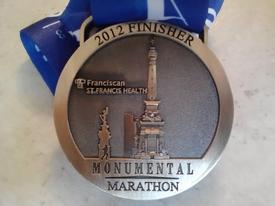Hit the wall...help!

allenpearcy
Posts: 227 Member
Before today's 20-miler, which was my last long run before my marathon in two weeks, I thought I had hit the wall once or twice....I was wrong.
Today's lesson included a shocking amount of muscle pain and cramps right about mile 19. I was tired of course; but, this was new to me. Last week's training run was 8 Fri/18 Sat and I did not experience problems on the Saturday run and felt pretty good at the end with and finished averaging my marathon goal pace of 9:40/mi.
For this week's long run, I took Friday off and combined my Friday and Saturday distance goals (and then some) to allow me to break the 20-mile mark. Today's pace was closer to 10:00/mi due to the walking I was forced to do occasionally in the last mile was pushing through searing pain.
As for fuel, I think I may have over-fueled if anything and I know I did not get nearly enough sleep (6 hours). For hydration, I carried water and PowerAde and nearly finished 20 ounces of each.
Thoughts?
Today's lesson included a shocking amount of muscle pain and cramps right about mile 19. I was tired of course; but, this was new to me. Last week's training run was 8 Fri/18 Sat and I did not experience problems on the Saturday run and felt pretty good at the end with and finished averaging my marathon goal pace of 9:40/mi.
For this week's long run, I took Friday off and combined my Friday and Saturday distance goals (and then some) to allow me to break the 20-mile mark. Today's pace was closer to 10:00/mi due to the walking I was forced to do occasionally in the last mile was pushing through searing pain.
As for fuel, I think I may have over-fueled if anything and I know I did not get nearly enough sleep (6 hours). For hydration, I carried water and PowerAde and nearly finished 20 ounces of each.
Thoughts?
0
Replies
-
I'm guessing that your body did not recover well after your 18 mile race pace effort the week before. Which begs the question, why were you doing it at race pace to begin with?
Assuming your goal race pace is grounded in reality, it's fine to run it for intervals or for shorter distance to train your body and your head to what it feels like but do that on your long runs, especially those in the high teens / low twenties, and you run the risk of leaving your marathon race in your training runs. And the recovery cost from doing that can be quite high.0 -
I agree that you don't need to run goal marathon pace for your long runs. The reason, as stated above is that the recovery becomes so great that it forces you to reduce the rest of the training week.
You can run the long runs up to 2 or more minutes slower than goal pace per mile and still get the desired training effect. (Mostly with the long run its all about time on feet in a low aerobic training zone.) With the reduced recovery time you can then run more mileage during the week and do some speedwork if its on the schedule. The net result is a greater overall training effect over time than if the long run wipes you out for a few days.0 -
Hmm, I don't enough about your normal training routine.
But my first thought on the cramps is sodium & potassium. Was it crazy sunny out there? My couple of true bonks have come on hot & sunny days where I was short on sodium.0 -
I agree that if it was hotter outside than normal, that may have added to the difficulty. I live in Texas and believe me, there is a definite pattern to the difficulty of my long runs and the temperature. But I also think you didn't recover from your run last week at race pace. Race pace is pushing ourselves so it takes longer to recover from a long run at that pace. One week is not enough time so those runs should be slower so you don't have to cut your overall weekly mileage. As it was mentioned earlier, you can do parts of your long run at race pace, but definitely not the entire thing.0
-
Thanks for the feedback everyone. I think you're right. I varied from my training plan because I was worried about not having done a 20/20+ prior to my run. I am in a full taper this week and my Marathon is next Saturday - a week from today. Today's 5-miler felt great and I think I am ready. I am going to keep reading on sodium and potassium levels though.
Does anyone follow a strict hydrating routine on the Marathon/long run to avoid getting too low? Or do you just follow body cues?0 -
Does anyone follow a strict hydrating routine on the Marathon/long run to avoid getting too low? Or do you just follow body cues?
Drink to thirst. That's all you need to do. The body is designed to dehydrate itself over time without a degradation in performance, and the to replenish when fluids are available. In my last marathon, I probably drank no more than 8 ounces of water for the entire race.0 -
I ran a marathon a few weeks back and I did the opposite. (I'm not taking away anything from Carson's advice -- he knows what he's talking about... for me -- it was about piece of mind and a chance to save my legs for the later miles.)
I walked through every water stop and drank water (about 4-6 oz.) every mile, and mixed it with some gatorade every second or third mile.
I would recommend bringing some energy gels or chomps for the race as well. I took energy chews at mile 7 and 17. My coworker uses gummy bears, and another friend always drinks a de-fizzed pepsi at mile 18. You find what works for you, but don't try anything new the day of the race. You don't want to have any surprises. Good luck!
Does anyone follow a strict hydrating routine on the Marathon/long run to avoid getting too low? Or do you just follow body cues?
Drink to thirst. That's all you need to do. The body is designed to dehydrate itself over time without a degradation in performance, and the to replenish when fluids are available. In my last marathon, I probably drank no more than 8 ounces of water for the entire race.0
This discussion has been closed.





